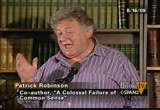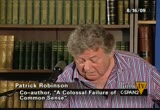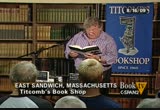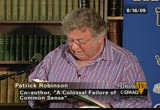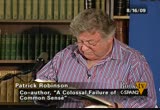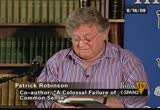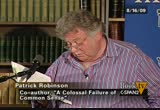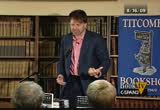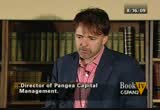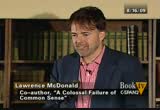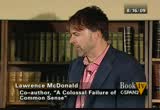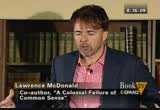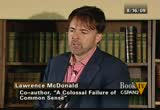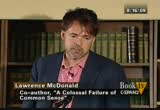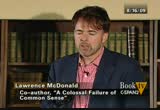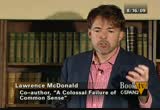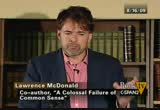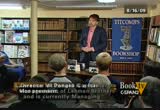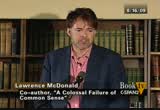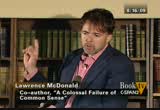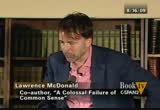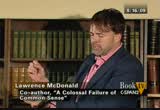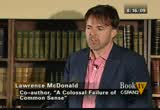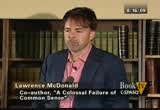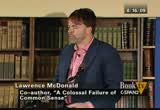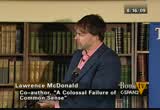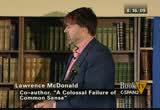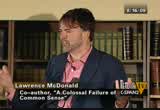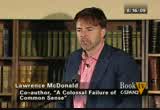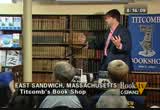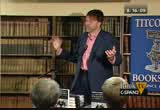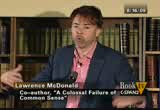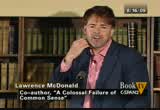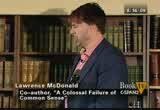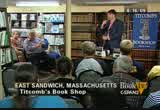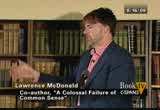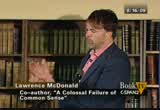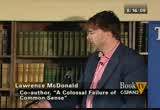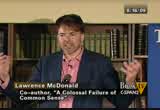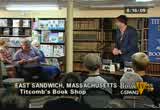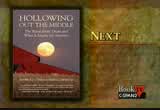tv Book TV CSPAN November 22, 2009 2:00pm-3:00pm EST
2:00 pm
2:01 pm
>> we had to attack it. i was always trying to write it for him. but it was different. for instance, it quickly became apparent that we had three major themes. lehman brothers were not all stupid. the two men negative ran the plays were spectacularly stupid that comes out as we go along but the most clever people in the company, of whom worked with larry. he was one of them. there were 10. they were actually in the boardroom saying you have to stop this. this cannot be allowed to go on.
2:02 pm
they set out there is an iceberg and we're going straight at it. even the titanic swerved. and again and again they were borrowing money, losing money. i knew they had these three miti is. barry had the documents they were warned to keep doing this we will lose billions in debt to. that is what they owed and they could not possibly pay back. there these three in front of me and when i came to write it, it was mind-boggling. i remember saying three times they were ignored. it was probably the worst triple since the st. peter denied crisis. but that is what a ghost writer is supposed to do. to gather these things together and make them kind
2:03 pm
of come alive. the book made "the new york times" list after friday's. i hope it will continue. it is a good book. weary was unbelievably brave. he really spilled the beans. he always said-- iowa said are you sure you want to say that? he would say that is what happened and that is what we will say. is testimony in a book. he picked the five most important people and lehman brothers, the biggest brains and the corporation who had helped him and who he verified things with and each one read the book from cover to cover. and not one of them made one of serious change. not want. and he had told a story that
2:04 pm
was not known a spectacular leap truthful, but it took a lot of courage to do it. and he did it. god knows i was really proud of him. he never wants pledge. i said this guy could both have us put in a cement jacket. he said to hell with it. he is talking about people who ruined thousands of people. it was terrible. people who worked a lifetime at lehman they had half a million shares at $75 was suddenly worth nothing. it was the most terrible thing you could imagine. that really is is about as much as i could tell you. but i will read you a couple of bits if you like. which we are showing you what it was like to write
2:05 pm
the stuff of four larry not knowing that much about it and trying to make it spring to life. it is still very difficult. this is a bit about when telco went bust part of a had an analyst in the firm who had been saying that delta could not survive. that is a pretty big thing to say about an airline. she said it could not happen. i will tell you about this. jane had been telling us for several months that delta was a candidate for bankruptcy and after 5:00 on the evening of september 14, 2005, she was proved right. it slashed delta files for bankruptcy protection and i
2:06 pm
swear to god it my heart skipped three beats. the convertible bond trader i had markets to make. i was on my feet in an instant. big joe was right next to be armed and ready to trade. delta nonconvertible bonds bonds, kirk talk was walking towards as i could see jane making a beeline from my desk just when i needed her. that is what i loved about her. during a time of crisis gonna she was always there. for the next hour there would be pandemonium as millions of delta bonds crashing through the floor would be launched on to the market by people trying to get the hell out of them. many of the bondholders or our best friends refer duty bound to purchase them and it would be flying like cannonballs millions of dollars worth of delta airlines bond that nobody wanted any longer.
2:07 pm
who lead talf applied was pumping and alex said steady, we are very for this. and stay focused. it was $0.52 each in a matter how many comes up for sale berry had once said about her flashed through my mind. jane can tell you what delta is serving 41st class on their morning flight from jfk and what it costs them. there's nothing that she does not know about the company. i understood the position of the bondholders. they would do almost anything to get out but i had to do an avalanche of selling. millions of dollars depended on my decision, which is why i guess every i on the entire floor was trained on us. everybody waiting for my first call on a price i would buy and the price i
2:08 pm
would sell. vividly and remember the fans winging and in the melt-- middle northwest also declared bankruptcy. it was one of those audible gasps on the floor what you hear in a big ball park when a fastball rips past the better part of jesus christ of thought the roof of fallen because we could also get hit by northwest bondholders bailing out but it is too late for a strategy. the high-yield sales go right into the air and larry, i have aig on end of wire. they are a seller. where you until tae? i need a bid right now. for a split-second and i hesitated and might feel they have 5 million where are you? i said 1618.
2:09 pm
lehman brothers was committed added $800,000 purchase come of 5 million bonds at $0.16 on the dollar purchase i said you understand there is no going back and confirming the first trade was now cast in marble part by heard mike buyer of his own confirmation to the customer. okay. 20 seconds later we were hit again. where are you one delta? 5 million. these people were desperate trying to get their holdings than the bank. i called the same price 16 but those words were hardly out of my mouth when we were hit again for another 5 million, then again. instantly i dropped the price 1517. you are done. maybe they would settle at 15 but they never did. our best distressed bond is sailor but max heller said where you until the right now? of five up?
2:10 pm
three more sell orders came flashing in and joe was talking in all directions. hit, by come a 10 million up. where you on the follow? h reading machine at that day was on his best. the salesmen, traders come a millions of dollars changing hands call them in the same direction out gerber cried dropped again and at 13 and still they came in. the ratio sellers to buyers was 10 :1. i got hit immediately more at 7 million. barry on the phone bought $5 million worth then the best salesmen i had said i have a buyer at 15, 5 million up to you want to let some fly? it was the only buy so far. jane said quietly we are stealing them. we're stealing them. stay focused. they are still worth $0.52. trust me. that is what this book is full of.
2:11 pm
that was being run by larry and i was going to read you a bad taste a bit about him. i think i have talked for long enough. it was trying to create that from someone who was across the amended goshen and i will turn over to him now to continue about his book. [applause] >> he is a tough act to follow. i just want to thank everybody for coming and spending some of our beautiful sunday with us. when i saw the forecast, i was nervous wreck it is nice to have everybody here. we came up on friday evening and made up the trip from manhattan and it is always worth the trip.
2:12 pm
we love coming back to the cape i grew up here and the story of lehman brothers around the weekend september september 15, really is a day that capitalism change for ever and our world changed forever it was a tough weekend and not only for the lehman employees but so many people around the country that their lives would change, of business credit lines were cut on credit cards, 401(k) became of 201k. and most of the problem 78 -- emanated from the tragedy that never should have happened. i was sitting there i was really down on the match. i felt like muhammed ali was standing on top of me.
2:13 pm
and the referee was giving me the account. and so many of us were down and i was really down. but i just wanted to dig deep down into the reserve that we all have to try to make lemonade out of lemons. i reached out to to jane and patrick and they were nice enough to give me the time. and patrick's agent was very helpful and articulating the project in helping me to understand what we were about to endeavor upon. as i am sitting there, the next day on the tarmac at jfk, i think it was a delta flight actually, just sitting there on the tarmac and you hear the throttle up
2:14 pm
and the engine and racing down the way. and i just realized as the plane takes off my life will change forever. i really vaunted to do this, to expose a few that hurt so many. there were so many wonderful people, so many wonderful people in the middle of the ship that or not only colleague warnings, but not everybody that works on wall street is an investment banker pulling in 5410 or 20 million per year per kid is true if we need these mated to the executive committee they pulled down 200 or 25 per year and there was a group of yes men and i.d.'s when did that were extremely loyal to richard fuld and extremely silent to richard fuld. the beginning of the story
2:15 pm
is what i am the most proud about if you walk into any bookstore in our country, you see piles and piles of financial books a lot of them written about the crisis but their foreign journalists and academics and patrick and i wanted to make this a human story to make people understand finance -- finance bring main street deep inside of wall street and help people to understand what happens in an investment bank and how it works. lehman brothers 158 year-old investment banker to 150 years. the brothers survives the civil war, the great depression, world war i, a world war ii, the korean war the nixon impeachment, it survives so much, 9/11. but what she could not survive was the change, a very dramatic change of business philosophy.
2:16 pm
and then they should business bank the reason is survived is it was in the moving business. campbell soup corporation 80 years ago wanted to build their first plant and make the first investment to create some jobs for pro it came to be met brothers and needed $10 million and it did traditional investment banking. even brothers is the black-tie investment bank. they raise that $10 billion and gave it to campbell soup and sold bonds and stocks to do it and made a fee. that is a traditional investment banking fee, a traditional business creates jobs, that is the moving business. what we started to see on the trading floor in 2004, 2005, 2006, you could clearly see bloodcurdling scare through the years going forward that the
2:17 pm
men -- lehman was getting into the storage business come a bigger bets kumbaya long assets, a commercial real estate and residential real estate they could not sell and trying to chase the big boys and chase goldman sachs, blackstone, there was a ruling of the dice trying to be the top investment bank. we were right in the middle of the bank. we were the fourth stage fourth largest we had much bigger investment banks above us. after glass-steagall was taken apart in 2000 and patrick did a wonderful job explaining what happened in the prologue, that allowed that act that took apart the glass-steagall act to allow the big commercial banks to compete against lehman which put lehman brothers and a very dangerous position because now lehman brothers is a small or mid-sized
2:18 pm
investment big now citigroup, bank of america and the large massive behemoths commercial banks with mass of deposits. remember, an investment bank likely men brothers does not take and deposits. it invests money around the world on the sell stocks and bonds but does not have people money in a bank the way citigroup, bank of america. they have over $1 trillion of real money in those banks and those are savings accounts, checking account, paychecks, but we started to see 2004 through 2006 was a very clear increase in leverage. lehman brothers increasing the debt to try to compete with the big boys. we got deeper and deeper it involved into businesses and investments that were very
2:19 pm
difficult to move as the years went on and leaving got deeper and deeper into the storage business. and retain this book "a colossal failure of common sense" i reached out to so many people, 150 people up and down the firm. i will never forget in those days september, october, november and especially december when people found out i was writing this book with the hall of fame ghost of patrick robinson my phone rang off the buck. executive committee members people that i knew distantly that all of a sudden became a very good ally. people on the risk committee reached out to me. people were so upset that this wonderful wonderful institution had been destroyed and as i peeled back the onion, though one horrifying thing that i learned was then than up on
2:20 pm
the 31st floor had a deep dark secret. they did not want to be exposed for all they did not understand. the 21st century brought a lot of changes but the most dangerous was 21st century financial products, securitization and the risks that were taking place in the marketplace that or so much greater and a domino's getting bigger and bigger and closer and closer together. lehman brothers was one big domino. as i peel back the yen and and spoke -- spoke to many people, i realize that it was not just me that saw richard fuld. we articulate in this year will we never saw the man on the trading floor or any members of the board or executive committee or trading floor but it was not
2:21 pm
just us, it was high and level of risk takers, people that thoroughly understood the risk in the system. people that understood credit derivatives who understood what warren buffett calls financial weapons of mass destruction. we have experts and they were not being consulted. we do not have financial talent not being consulted. those men upstairs, did not want to be exposed for all they did not understand. 2006 through 2007 they started to see people stand up and courageous and brave people start to stand up. i will never forget june 6, 2005, we were in a meeting with all of the traders, risktakers, research analyst and michael started to do something which was very unusual.
2:22 pm
most people on wall street in the big meetings are very politically correct but also very financially correct in terms of not wanting to upset the people on the 31st floor. and michael, along with others, i will never forget how he started to question the evil financial products in the system, the evil mortgages that started off at 2% and then maybe a year and a half later or two years later are up at nine or 10 or 11% resetting and the commissions that the mortgage people around our country coming the incentives to sell the most evil products. and when michael was concerned the gdp in the united states in 2007 the/2008 would be punched in the gut as the mortgage resets start to hurt families at some point* you have to pay the piper.
2:23 pm
there were so many of these products i will never forget the warning about subprime and i had never heard of. i did not know about that in 2005 and this is the first time i was exposed to these words and mortgage resets almost on the american vernacular it was the best and bravest smartest people of lehman brothers started to call the warnings. the tragedy of the men brothers the warnings were ignored and people were silence. lehman brothers kept to their head down and did their job. i saw one great person after another silent global risk manager 2005 would be a one investment banking questioning whether or not
2:24 pm
remission get into a big deal and richard fuld said shut up. this is what they had. a sense of fear and a tragedy was that we were going faster and faster and faster rate toward that iceberg. one by one by a wide great people that i really care a lot about or silence. there were so many lessons for us all. going forward if you think about it, the brothers at the top of the market $750 billion investment bank. we have $750 billion worth of stock and bond and residential real-estate 44
2:25 pm
/1 leverage and the board of directors never once complained. the board still had inexperienced people, experienced people, not financial experts. going forward if you have a systemic risk bank that is one giant of the you have to have financial experts on the board. people that understand credit derivatives, understand commercial real-estate securitization burma you have to have experts. i was very encouraged on friday i noticed that aig had made a move to permanently detach the chairman and ceo rules. on wall street, 2007, you had a proliferation of ceos who were also chairman of the board. and as you are writing the book, patrick did not
2:26 pm
understand much about finance said that is less fox looking after the chicken coop and i could not agree more. talking about a situation where lehman was day it monarchy one man with an incredible position of power to the point* they appointed a cfo in 2007 with no experience ever as a cfo on wall street. just at the time as our president and chief executive officer wanted the new cfo and the role, they had the free rein to put lehman in a very dangerous position. and i think going forward, the last thing that i would say is to help the country to make it a better place, the regulators that exist, that are supposed to be protecting us all and protecting us from the
2:27 pm
systemic dangers in the system, in 2007, we had the sec, fdic, office of thrift supervision, ssa europe, asia, all of these are movers and regulators with hundreds of thousands of people working but not as a coordinated group with a complete lack of coordination, a complete lack of risk-management when you have all of these regulators that would oversee the dangers of supposed to be overseeing these terrible risks growing through 2007. and the reason this is not only richard fuld problem but our regulators said they were so horribly horribly uncoordinated. going forward if we ask people to be in the rules of regulation we should have
2:28 pm
people that have a global systemic risk manager that look at the whole picture and leverage all-around wall street and the different banks. and have there be accountability. capitalism cannot work without transparency. we have to have transparency and risk. not investment banks and/or black box is in a more. really, from the bottom of my heart, i wrote this book because we never ever want to have this happen again. i still live six blocks from lehman brothers. and occasionally once or twice per week i walk buy i promise myself and i promised myself i will not look up. i will not look up to see where we had such a wonderful time and has such great people that were silenced. such a great group of people
2:29 pm
there really worked so hard each and every day. i promised myself i will not look up. but in the end, i always look up. and i am so proud that i worked in such a great place. thank you very much. [applause] >> who represents the u.s. state treasury deposit? it was a woman appointed years ago and she started pointing at all of the loopholes where money was disappearing within our government and she was silenced. she was removed because she was finding out where it was going.
2:30 pm
2:31 pm
talking to the best and brightest we had and say the state of california is doing this, the state attorney general massachusetts is doing that, and a lot of those people were adored and i think one of the other tragedies of the failure of lehman brothers is the head of the new york fed and in those last days of lehman brothers in september when all these bailouts were happening were taking place but in that last weekend in where we have the best and brightest finally. that 31st floor, sunday, september 14th we had our executive committee begging the government for help because they had helped fannie and freddie and bear stearns, we wanted help and tim geithner was chairman of the new york fed, one of our big
2:32 pm
regulators and mysteriously since fox news has recently reported on this mysteriously his cell phone was turned off on that sunday evening at 7:00 o'clock when lehman brothers was really reaching out for assistance. lehman brothers, i just want you to remember one thing -- i hate bailouts, i despise them but lehman brothers was put to sleep. lehman brothers, they took the pillow and put it over the face of lehman brothers. they really did it. >> y? >> because i guess a lot of people say it was a moral hazard moment, they wanted -- there were some people that wanted to make a stand. i think there is a long history of tensions between richard foltz and hank paulson. not lifelong but many years ceo, head of goldman sachs, and these were large competitors and in
2:33 pm
essence goldman sachs has become an oligopoly because merrill lynch's gone, leamond is gone and bear stearns's gone in some of the other banks are making more money than ever. >> bank of america? >> bank of america, citigroup, goldman and jpmorgan, those are the four. >> two just kick in money from bailout. >> morgan would be the fifth. >> how has writing this book change your financial career? >> a lot of in the sense that i'm not going to be there any time soon and that means i'm not going to be working on a trading desk. [laughter] with richard foley or any of these guys. but i find it a really interesting, a week ago friday i got a call from one of the best,
2:34 pm
los alamos time nuclear physicists that a really deeply understood credit derivatives and he was so happy about the book, so happy about his role and wanted to sing patrick for the poor trail of credit analysts. he really felt proud and he said why don't you come up on the trading pool. so i went there about 530 on friday, this was a friday afternoon and who the trading floor is half full. this is barclays bank, they bought the brennan seven lehman brothers services lehman brothers trading for 7,457th avenue mine back at the scene, not the scene of the crime but the same trading floor i used to work and i noticed in the corner office i said who it is that man in the corner office? and as he said to me, that is bought diamond, and i said it
2:35 pm
the ceo of barclays' capital? and he said, yes. how things have changed. things have changed in the sense that you have lessons learned hopefully, you now have the ceo of barclays' capital right there on the trading floor with the best and brightest paying close attention to what is going on. not in the 31st floor completely away from the battlefield. >> unit, and at the beginning that this was the end of capitalism in america but had you mean that? >> not the end of a capitalism has been changed forever because first and foremost you have the fed window, the federal government has now been assisting banks have to the primary credit facility. in other words, you have investment banks that are having access and getting help from the
2:36 pm
government, that started with essentially bear stearns and then you have all these turpin and it talf and all these things pass in september, the initiatives to help securitization in lending startup again and because you see all these programs and so much of this help and then talf in the t.a.r.p. and goldman sachs in companies, lehman wanted to become a holding company and tim geithner said no and there were then allowed to become bank holding company so i think going forward especially in the short term you're going to have a pendulum swing or you have overregulation in terms of minute regulation of capital, less leverage, less real freedoms because the problem is that things got so opaque and so dark, capitalism doesn't work
2:37 pm
without transparency so some of these banks and the risks were so difficult to see that i think the regulators are going to force more visibility and that will change capitalism forever. >> what happened before 2005 that brought all the change on? >> in terms of the problems? it was deregulation which is fine if you have good leaders who watch a risk and i think what happened was you had the deregulation and started everything moving but you have to remember before the market tracked in 2007 that summer we had a 48 month time when the s&p 500 didn't decline more than 8% so you have this incredible
2:38 pm
tranquillity and what that brought on was this proliferation of what i call peacetime generals that started to head a major investment banks and commercial banks. chaka prince was heading citigroup and he really wasn't, not a risk taker, he's really kind of a lawyer. so you have a lawyer running it and our number two guy and lehman brothers mr. gregory, this guy -- these guys were consumed up on that 31st floor with wonderful things like philanthropy, diversity efforts in richardson to a thousand dollars art collection and so if you think about it these people were sitting on $750 billion of risk and all across the street people work as soon with bizarre things that have nothing to do with all the risks day-by-day.
2:39 pm
they did ed lehman, but they were annihilated. they lost a lot of their wealth but everybody else --. >> [inaudible] >> you have the operating table. in lincoln was getting light support a couple months ago. and they gave experimental drugs. there are all these cuts to try to revive the economy and that is the way it was always done in this country which is an
2:40 pm
experiment for us. in the economy right now is on a sugar high, but we can expect the patient that is anna life-support to get up and run the projects. and that is what some people are saying and that we have had a wonderful rally. this rally is turning into people chasing the next bomarc it, but i don't think we can go halfway back to the old boat and then a natural progression out of this.
2:41 pm
>> [inaudible] >> i'm glad you asked that because this is said earlier a despise bailouts, but one thing that i have mathematically figured out with the help of great people it is that when the lead to lehman fail remember aig failed three his letter and merrill lynch, that means the other bailouts incredibly more expensive. because they let lehman go on that sunday night and then aig had all these complicated cds contracts uncomplicated risks that became incredibly more expensive after lehman failed. aig, the initial estimates on aig bailouts 30 to 40 billion within a month of a half, the government is telling us is going to be $200 billion to bail out aig and some of that money
2:42 pm
was two goldman sachs so a lot of this stuff going on i think that the failure of lehman brothers costing u.s. taxpayers about $140 billion. now, if they had saved a lehman which you would have seen it was a natural unwind of the rest. in other words, which should have happened was he could have brought in a u.s. bancorp, for example, can lewis of bank of america saved merrill lynch, tim geithner and hank paulson essentially put kenneth lewis in a headlock and ordered him to bail out a merrill lynch. if you're going to put people in headlock you can put the ceo and u.s. bancorp in a headlock and say bailout lehman brothers and the reason that is important is you had after lehman failed close to $700 billion worth of
2:43 pm
commercial real estate, residential real estate, stocks, bond, everything. lehman had tons of assets and what goes into bankruptcy you have a bankruptcy reorganize their and they are interested in selling assets and unwinding risks and this was the most horrifying and wind in the history of all bankruptcy's. there was no preparation the documents to the lehman document was only 15 pages long, this is almost a $700 billion bankruptcy and the initial document presented to judge packin the bankruptcy court was only 15 pages long. this document should have been 300 pages long to articulate how they're going to unwind this risk so what happened was after lehman failed and you had this on winding that with some nasty and that's why in october and november, remember how the stock
2:44 pm
market was going down every day around 2:00 o'clock, another to 300 points, is because lehman was in there unwinding other hedge funds, bringing down dominance literally and that hurts so many people. so if lehman had been saved you could have a situation with assets were sold in a much more orderly control why. instead of a grazing has hazard. all i know this, a lot of people tried to save face but it is really liked.
2:45 pm
2:46 pm
there and. [laughter] it is obvious what they were doing. and they were sitting on top of all of this. the had a steamroller, they had a good thing going. i think i'm going forward they say that the ceo of morgan stanley, he should be the requirement as he requires and to be on it in leamond board for three years. so you could have financial experts that are on these boards
2:47 pm
with the financial experts but then in essence lehman was $750 billion domino. responsible for the world. that is a problem. in the bank of america did not properly understand the dangers of the investment vehicle, that bank of america one of our largest banks to call this is in people's money. they were investing in very dangerous stance and lewis is still seen of the bank of america. even though he lost all that money. so that is a moral hazard and
2:48 pm
that is why i hate bailouts, but i also feel that if you let people go like lehman brothers it can really hurt a lot of people the way it has. i'm writing this book not just for lehman employees but we have really brought the attention to the mainstream. i'm getting wonderful e-mail's, twitter from people that are in construction and sing for the first time i understand finance and that makes me feel really good. [laughter]
2:49 pm
>> thanks for the headlock that the government officials put listen. how can they compel such a private powerful figure to take on such a? >> isn't it amazing? you can see -- chairman of the house oversight committee, he has these hearings over the last month and half and he brought up kenneth lewis and ben bernanke and he brought up in paulson. and you can see the tension because now he is out of the headlock but he has already made these purchases countrywide, kenneth lewis the ceo of bank of america bought countrywide first and i think on orders and i think he bought merrill lynch second and i think under orders. in the nature is that they really needed when we kind of joke around a bank of america became of the fourth branch of the u.s. government. i think he felt it was a patriotic thing, build long-term was making a good investment
2:50 pm
bell was making terrific investments. they paid $50 billion to merrill lynch, waited a week and a half so i can't explain. >> the point was two convince the markets that they really are worth that much. >> as wright, a poker game. the whole role was to put everybody andes and let lehman go but nobody else was when to let go and we're going to solve this crisis. another theory is in this is a deep dark theory, a lot of people feel that they let lehman go because you're either sure that the t.a.r.p. would be passed and the t.a.r.p. means capitalism. i don't think the t.a.r.p. would have passed if lehman had failed because remember lehman failed when t.a.r.p. didn't pass the first boat and then two days later it passed. >> are we going to be gobbled up by that banks and be controlled by them?
2:51 pm
>> i hope they do, i hope -- that's one of my great allies in the book. there is a scene where alex kirk says there was a meeting some of the great people% of lehman brothers and the great people that were silenced after the coup in june of 2018, they were asked to, and there was a meeting in alex kirk's apartment, the new leadership of lehman. there is a scene in the book or they're talking about that very problem. you have all these big banks and there really aren't enough creativity's. the banks of and bigger and the dominoes have gotten bigger and bigger and alex leans back and says, these banks are too big to fail. they're not too big to fail, they're too big to succeed. and i hope and other words citigroup, all these banks, bank
2:52 pm
of america have become so big that you can't have a new ceo analyze all the risk. and that is one of the dangers and that is why i hope the force a lot of these banks to break up. so that you can compartmentalize risk. >> whoever that woman was u.s. treasurer she said because we are supporting and i am guilty chase, citigroup and j.p. because we have their credit cards, we are part of the problem supporting them. we should be going to smaller banks. >> that is one of the great things patrick does in the book. he articulates so beautifully and simply this 21st century securitization process and lending. when my dad bought our first home he sat face-to-face with a banker and that was a member of the community, that baker was
2:53 pm
involved in charities and things like back and with the 21st century we had securitization so you have a lender in icelandic lending money through lehman to a mortgage broker and lending money eventually to some bus driver in newport beach living in a three and a thousand dollars home and had no income verified by the lawyers. so we do need to go back to smaller banks. >> one of the classics was the ninja mortgage, no job and no assets. [laughter] there is a form of thousand dollars a year bus driver because he does and how to put his income down. occupation bus charter, income $400,000, all with these massive
2:54 pm
mortgages that they couldn't possibly pay back. and the brokerage house the amended to them did not care because they sold it under lehman and lehman didn't care either because they sold it to iceland so this poor guy in the house that can't pay the mortgage is in some kind of a worse something. he doesn't already goes to. >> he was very informative, very educational presentation and there's a part read talk about stocks in california and our country with your hand in these crazy lending of but you have pockets where it was extremely concentrated in and of the crazy pockets was stockton and you're telling donnie about the scene when things start to break in 2008 you had people leaving home
2:55 pm
and taking the copper wires, taking everything possible, the refrigerators and putting them in the back of a truck and you haven't bomb literally traffic jams had to in the morning with these people trying to get out of stockton. stockton, california. the mood down and the asparagus and basically put up a city, and nasa is growing because all the people were trying to get out too. >> the whole place and they quickly realized that something wasn't quite right when i worked out that they had the highest amount of illiteracy and the
2:56 pm
highest amount of crime in any country in the entire country. and then when the mortgages went from 800,000 nobody complained and everybody laughed. the recruiter, washing machine, dry air, carpets. >> we were hearing the stories, we were hearing these on the trading floor in late 2000. the first quarter was in 2007 called early payment default. and i promised myself i'm going to watch for these warning signs and there is a early payment default and it was a measurement of the amount of people that were even making the first mortgage payment and it is spiking up in late 2006. that is pretty crazy.
2:57 pm
>> it is very strange, there were people, very clever people in lehman who blew the whistle very quickly. and there were people, he wouldn't say the u.s. right in the thick of the group of the people who were actually blowing the whistle and saint this is lunacy. he had a receipt of this and he was one of the matadors' trying to state this raging bull.
2:58 pm
>> we now have an opportunity free to sign the books. >> i want to think c-span for taking the time to come down here all the way. i hope you enjoyed a clairaut are lobster after we're done. [applause] >> lawrence macdonald is a former vice president of the lehman brothers is currently managing director mingei capital management and his co-founder of convertbond.com, it website for convertible securities information period patrick robinson is co-author of "lone survivor" which u.s. navy seal marcus luttrell. for more information visit lawrence mcdonnell.com. >> in his book "hollowing out the middle" sociology professor patrick carr looks at young people in small towns leaving their homes. he says this leaves behind a largely immigrant segregated
2:59 pm
population. making a small middle american towns look more like inner-city. the sumner public library and i what is the host to this event. it's about an hour. >> thank you very much. i'm thrilled to be here. and i hope it's 7:00 o'clock i am still as thrilled apparent. i think i have two strikes against me. what is i'm an academic so i am totally in not used to having anybody really care enough about what i do to show up to talk. [laughter] so this is where i'm feeling pretty edify right now appearing in the second strike and have against me is that i'm irish. of [laughter] that might be a bigger strike actually perry and being
243 Views
IN COLLECTIONS
CSPAN2 Television Archive
Television Archive  Television Archive News Search Service
Television Archive News Search Service 
Uploaded by TV Archive on

 Live Music Archive
Live Music Archive Librivox Free Audio
Librivox Free Audio Metropolitan Museum
Metropolitan Museum Cleveland Museum of Art
Cleveland Museum of Art Internet Arcade
Internet Arcade Console Living Room
Console Living Room Open Library
Open Library American Libraries
American Libraries TV News
TV News Understanding 9/11
Understanding 9/11

